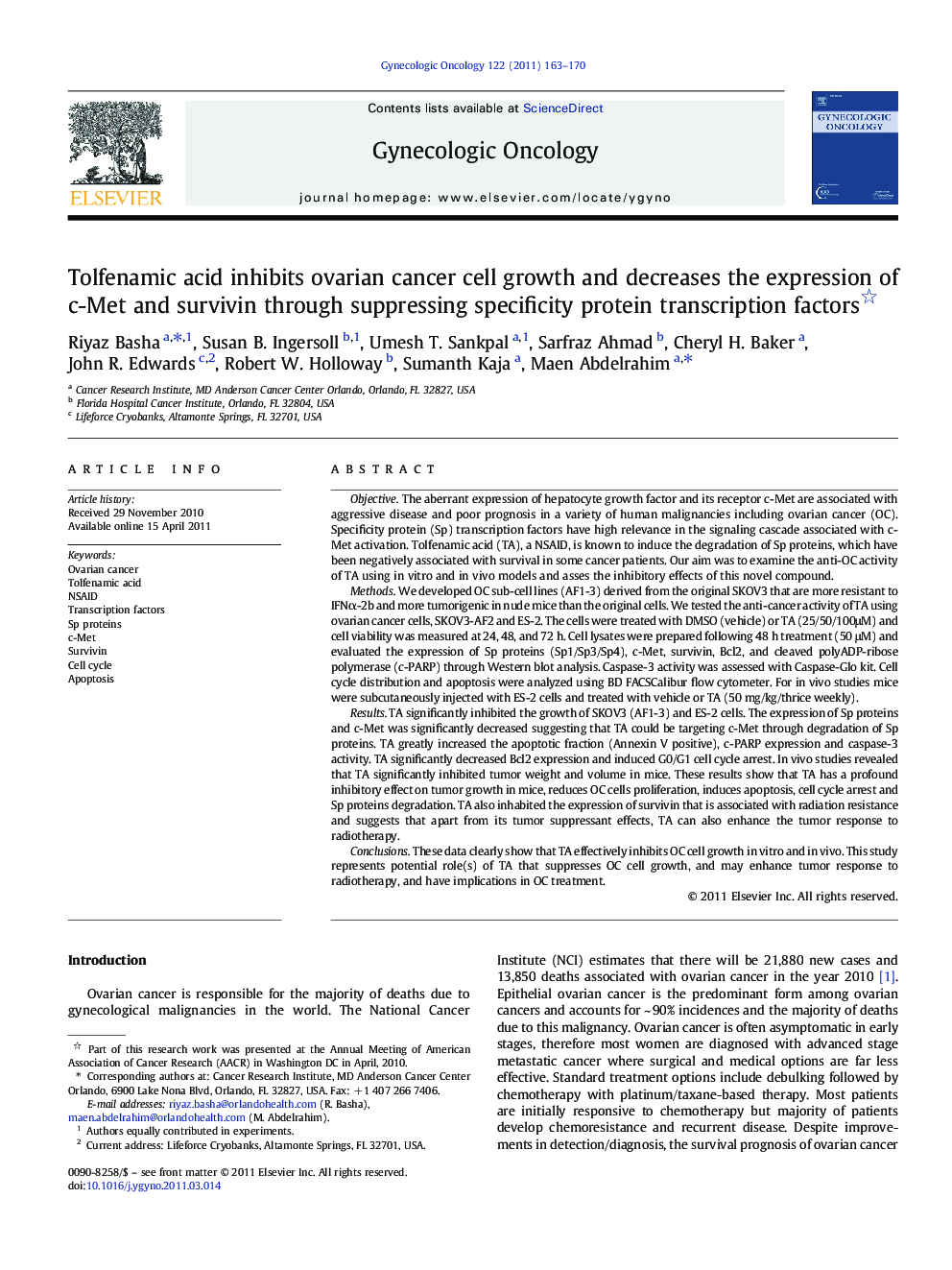| کد مقاله | کد نشریه | سال انتشار | مقاله انگلیسی | نسخه تمام متن |
|---|---|---|---|---|
| 3943029 | 1254066 | 2011 | 8 صفحه PDF | دانلود رایگان |

ObjectiveThe aberrant expression of hepatocyte growth factor and its receptor c-Met are associated with aggressive disease and poor prognosis in a variety of human malignancies including ovarian cancer (OC). Specificity protein (Sp) transcription factors have high relevance in the signaling cascade associated with c-Met activation. Tolfenamic acid (TA), a NSAID, is known to induce the degradation of Sp proteins, which have been negatively associated with survival in some cancer patients. Our aim was to examine the anti-OC activity of TA using in vitro and in vivo models and asses the inhibitory effects of this novel compound.MethodsWe developed OC sub-cell lines (AF1-3) derived from the original SKOV3 that are more resistant to IFNα-2b and more tumorigenic in nude mice than the original cells. We tested the anti-cancer activity of TA using ovarian cancer cells, SKOV3-AF2 and ES-2. The cells were treated with DMSO (vehicle) or TA (25/50/100μM) and cell viability was measured at 24, 48, and 72 h. Cell lysates were prepared following 48 h treatment (50 μM) and evaluated the expression of Sp proteins (Sp1/Sp3/Sp4), c-Met, survivin, Bcl2, and cleaved polyADP-ribose polymerase (c-PARP) through Western blot analysis. Caspase-3 activity was assessed with Caspase-Glo kit. Cell cycle distribution and apoptosis were analyzed using BD FACSCalibur flow cytometer. For in vivo studies mice were subcutaneously injected with ES-2 cells and treated with vehicle or TA (50 mg/kg/thrice weekly).ResultsTA significantly inhibited the growth of SKOV3 (AF1-3) and ES-2 cells. The expression of Sp proteins and c-Met was significantly decreased suggesting that TA could be targeting c-Met through degradation of Sp proteins. TA greatly increased the apoptotic fraction (Annexin V positive), c-PARP expression and caspase-3 activity. TA significantly decreased Bcl2 expression and induced G0/G1 cell cycle arrest. In vivo studies revealed that TA significantly inhibited tumor weight and volume in mice. These results show that TA has a profound inhibitory effect on tumor growth in mice, reduces OC cells proliferation, induces apoptosis, cell cycle arrest and Sp proteins degradation. TA also inhabited the expression of survivin that is associated with radiation resistance and suggests that apart from its tumor suppressant effects, TA can also enhance the tumor response to radiotherapy.ConclusionsThese data clearly show that TA effectively inhibits OC cell growth in vitro and in vivo. This study represents potential role(s) of TA that suppresses OC cell growth, and may enhance tumor response to radiotherapy, and have implications in OC treatment.
Research highlights
► Reports a novel approach for targeting c-Met in ovarian cancer epithelial cells.
► Outlines importance of suppressing Sp transcription factors in ovarian cancer therapy.
► Identifies a small molecule (NSAID), tolfenamic acid (TA) for ovarian cancer therapy.
Journal: Gynecologic Oncology - Volume 122, Issue 1, July 2011, Pages 163–170